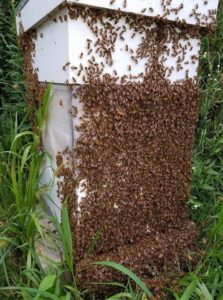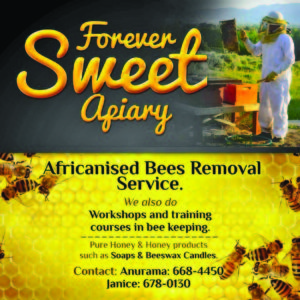
“Bees should not be killed. They should be protected and cared for because without them we would have no fruits, flower and honey among other things. That is what we need the people to know because of how important they are,” says beekeeper Janice Fraser.
The 62-year old has been a pioneer in the local apiculture sector, often imparting her knowledge and wealth of experience to younger generation beekeepers. Janice, a one-time Foreign Service Officer, explains that while on overseas assignment her interests in a lot of things developed and beekeeping was one of them.
Being a “town girl” all her life, prior to moving Brazil, had limited Janice’s knowledge of certain agricultural practices and she became immediately fazed with the art of beekeeping. This resulted in her dedicating her weekends towards learning the trade from some of the masters in the industry.
“When I met this apiculture I never knew before how bees were kept and all of that and when I went in with it I just went in for curiosity sake. I recognize that from this little box, you can get so many products and I started to pursue it from then,” she said.
She explains after she finished the training workshop in 1993, she got her hand on a few hives and began her journey into the world of bee keeping. Following the end of her assignment, Janice returned home with a new passion and hunger to get into the apiculture sector but was sadden to know that it virtually did not exist.
“When I returned home, I immediately started to check the sector out and found that there was no organization or anyone that I could get into immediate contact with. In 2008, I met a man name Rajkumar and then my journey started. The first time was when I got a call to remove a hive from a school compound and from there I never looked back,” Janice recounts.  Janice says it irks her that a lot of people are now in the bee-keeping industry just for the money adding that it harms the bees since those persons are not patient enough to wait for the right time to extract products from the hives. Additionally, the term “honey is money” is another misconception she says.
Janice says it irks her that a lot of people are now in the bee-keeping industry just for the money adding that it harms the bees since those persons are not patient enough to wait for the right time to extract products from the hives. Additionally, the term “honey is money” is another misconception she says.
The veteran beekeeper explains that honey is actually the cheapest product from the hive since one can extract other products such as pollen, wax, royal jelly and propolis, which are much costly. But noted that the need for those products, within the local framework, is not there. Propolis or bee glue is a viscous mixture that honey bees produce by mixing saliva and beeswax with exudate gathered from tree buds, sap flows, or other tress and is probably the most expensive product from the hive. It fetches a price of approximately $15USD per ounce and depending on the weather, number of bees and size of hive one can extract at least one pound propolis per week.
Propolis or bee glue is a viscous mixture that honey bees produce by mixing saliva and beeswax with exudate gathered from tree buds, sap flows, or other tress and is probably the most expensive product from the hive. It fetches a price of approximately $15USD per ounce and depending on the weather, number of bees and size of hive one can extract at least one pound propolis per week.
The beekeeper cautions that the rule of thumb is that one can only extract one product at a time from the hive and if this rule is not followed then there can be dire consequences.
Currently Janice tends to her approximate 15 hives along the East Coast of Demerara. She boasts that her hives have approximately 80,000 bees each and that plans are in the pipeline to expand her investment with an additional 100 hives.
Janice recently acquired a plot of land in the Rock Stone/Anarika area where she plans to facilitate her expansion. For now she is well known within the sector and notes that her honey “Forever loving you honey” is sold out even before she is finished extracting. (Photos provided by Forever Sweet Apiary) (Guyana Times Sunday Magazine)



